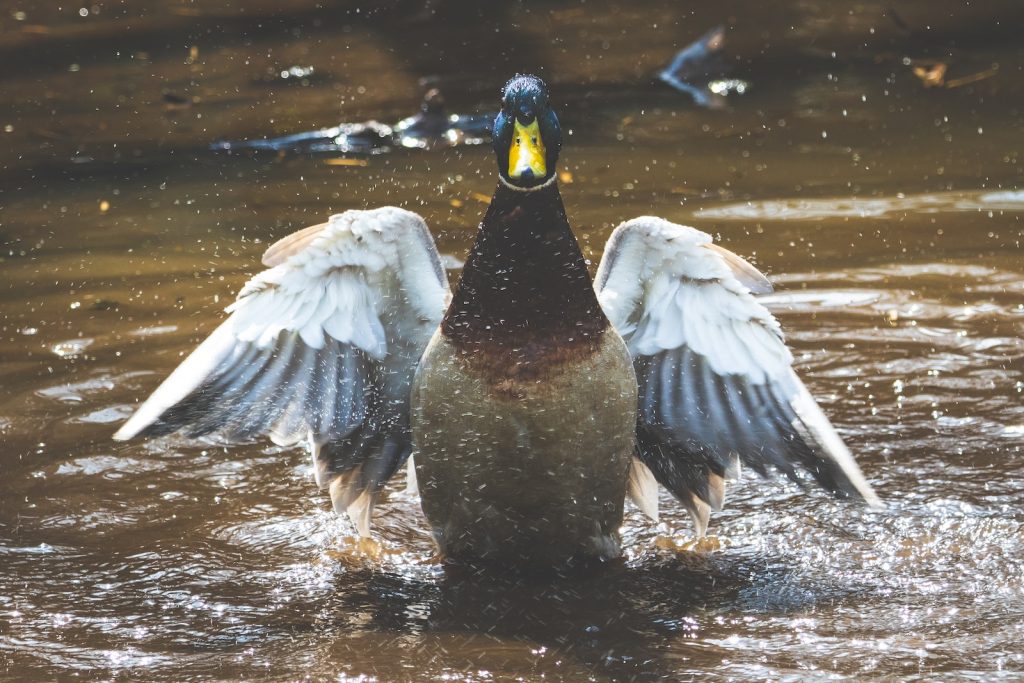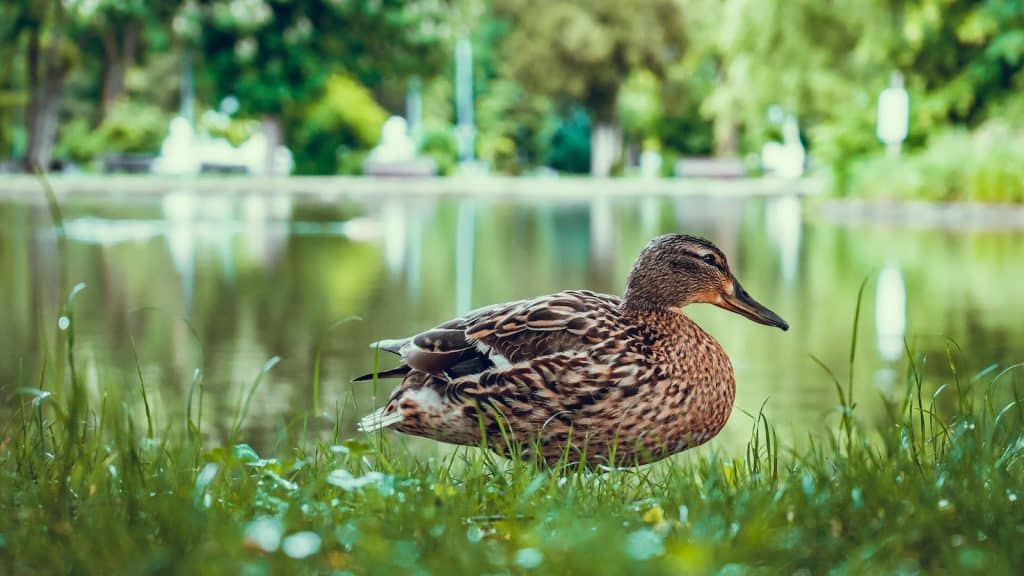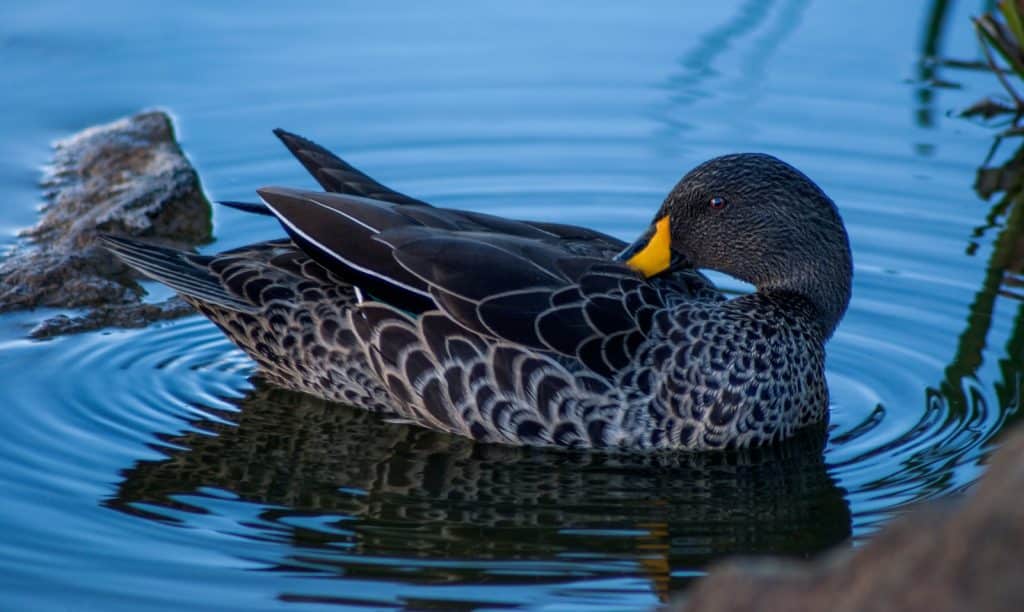
Ducks are popular farm animals that can lay eggs at no cost to the family and also bring joy as an interactive pet. There are more than a dozen types of farm ducks, including the Buff Orpington duck. The Buff Orpington duck is a large, sturdy, and easy-to-care-for breed. Learn more about their behavior, lifespan, care requirements, and other details.
Here are some quick facts about Buff Orpington Ducks
| Species Name: | Waterfowl |
| Family: | Anatidae |
| Care Level | Moderate |
| Temperature: | Variable |
| Temperament: | Friendly, intelligent, interactive, pack-mentality |
| Color Form: | Yellow feet, buff body |
| Lifespan: | 8-12 years |
| Size: | 7-8 pounds |
| Diet: | Grains, scratch, worms, bugs, veggies |
| Minimum Coop Size: | 4 square feet |
| Minimum Run Size: | 10 square feet |
| Compatibility: | Moderate |
Buff Orpington Duck Overview

The Buff Orpington duck was created in the U.K. for both eggs and meat. In the late 1800s, they made their debut in London and have been popularized in many other countries including the United States. They are tough animals who love to display their intelligence and satisfy their curiosity.
These ducks make great pets for families with young children. They are quieter than other duck breeds. Orpington ducks will warn you if there are predators or other animals on their property. They are happy animals who will just let their environment take care of themselves when all is well.
What is the cost of Buff Orpington ducks?
Baby chicks are available for purchase starting at $2 to $10, depending on the number you wish to buy. They can be slightly more costly if you wish to buy eggs to hatch at your home. Prices for adult ducks range from $15 to $40 depending on the quality of their eggs and meat.
The Typical Behavior and Temperament
Buff Orpington ducks, which are curious and lively, spend much of the day exploring and hunting for food. They are docile and don’t make a fuss about people coming around. Because of their lively nature, they are happy to roam free in areas that are safe from predators.
They can live happily in both warm and cold climates because their feathers keep them warm and their swimming waters cool them when they need it. Males will tend to be more attentive than their female counterparts, and will also keep an eye out for the ducklings when they explore. The Buff Orpington duck can actually be trained to respect boundaries and return to their sleeping areas when instructed.
Appearance and Varieties

These large ducks are medium-sized to large in size and have long, curving necks. Their tails are curly and short. They have medium-long wings that stay close to their bodies for most of the day. They are buff-colored, although some call them light brown. Although they may have white markings, this is not a common trait.
As is the bill of the male duck, their legs and feet are also yellow. The bill of the female duck is often light brown or orange. The small, bright eyes of these ducks convey intelligence and alertness. Adults can weigh around 8 pounds.
How to Care for Buff Orpington Ducks
This duck breed is moderately easy to care for. To be happy and healthy, they need a safe place to spend their time. Here are some other things you should know.
Habitat Setup & Conditions
The Buff Orpington ducks may be left to their own devices in a fenced space, where they can be protected from any predators or stray dogs. A house should be built for them so that they are protected from the elements. Each bird should have at least 4 feet of living space in the interior.
Living in enclosed habitats requires that the enclosure contain housing and provide at least 10 feet of space for roaming. They will be happier if they have more space. They should have a small swimming pool, small water tub, or pond in their habitats, enclosed or free-range. These ducks could overheat in the summer months if they don’t have a water tub, swimming pool, or pond.
How to feed your Buff Orpington Ducks
In the wild, ducks can forage all day and eat a variety of foods. Small fish, frogs, and insects are some of the foods they eat. These animals can be kept in captivity and can be fed whole foods. However, it can be difficult for human companions to provide a nutritious meal daily for them.
Owners can choose to feed their birds a commercial mix of feed. This will provide the birds with all the nutritional requirements they need. As snacks, you can offer any of the listed foods, along with lettuce, small amounts, or leaves. To support their digestion, ducks should have easy access to gravel and sand.
Keeping Your Buff Orpington Ducks Healthy
Because ducks dig in the ground all day long, they are more susceptible to parasites and worms. They should be treated with an anti-worming medication once a year. Except for extremely muddy ducks, no special grooming is required. In such cases, you should take them to the water source and give them a bath. Good health requires that your ducks have access to fresh water and healthy food every day. It is a good idea to have your birds checked by a veterinarian at least once a year.
Are Buff Orpington ducks compatible with other pets?
Although ducks will get along with other farm animals, they might not be able to live with dogs or other household pets if they are threatening. If possible, introduce your Buff Orpington ducks to other animals as soon as they are babies. They will tolerate a relationship with a particular animal more easily if they are familiar with it sooner.
Are Buff Orpington Ducks suitable for you?
The Buff Orpington ducks can be a rewarding companion and provide free food all year. These animals are intelligent, curious, friendly, and intelligent. When making your final decision, it is a smart idea to compile a list of pros & cons.
Which is your favorite thing? Let us know what you think by leaving a comment.
Are Buff Orpington ducks uncommon?
Drake: 2.2 – 3.4 kg, Duck: 2.2 – 3.2 kg. The Buff Orpington is a rare and endangered species of domestic duck.
What is the rare duck breed?
Pochards from Madagascar A flock of Madagascar pochards, the world’s rarest duck, was released into the wild as part of a ground-breaking conservation operation to preserve this critically endangered species from extinction. For 15 years, the species was thought to be extinct until its rediscovery in 2006.
What is the name of the king of all ducks?
canvasback, noble The majestic canvasback, revered by old-time waterfowlers as the King of Ducks, possesses every quality a duck hunter might respect. It has a huge body yet is sleek and stylish. The male’s crimson head is raised high, and his blood-red eyes are evident.
Which duck has the quickest growth rate?
Pekins are the fastest-growing breed and, due to their white feathers, dress exceptionally nicely after processing. Several of our clients successfully employ these birds for pasture-reared ducks.
What kind of duck lays 300 eggs every year?
Runner ducks may lay around 300 eggs each year. Khaki Campbell – This breed originated in England and is noted for being a quiet and gentle breed, making it perfect for youngsters or people new to duck breeding. Each year, Khaki Campbell ducks lay between 250 and 340 egg
How many eggs do Buff Orpington chickens lay in a year?
between 200 and 280 eggs Each Buff Orpington lays between 200 and 280 eggs every year. These eggs are light brown in color and are usually “Big,” which cost a little more than your normal shop-bought egg.
How long does it take a Buff Orpington to mature?
between 5 and 10 years The Best of the Buff Orpington Heavy Heritage Dual Purpose Breed Yes Weight: Rooster 10 lbs, Hen 8 lbs Countdown to Maturity in Weeks between 20 and 22 weeks Typical life expectancy is 5 to 10 years. •
What is the finest Buff Orpington feed?
Depending on your eventual aims for rearing this breed, you can feed your Orpington hens conventional egg or broiler feed. Instead, you may supplement with healthful delights such as mealworms and bananas. Just avoid giving them any of these meals.
Which hens get along nicely with Buff Orpington?
Because of their placid demeanor, Buff Orpingtons are easily bullied. They work best with chickens that are calmer, such as Brahmas, other Orpingtons, Cochins, Sussex, and Faverolles.
Are the Buff Orpington Ducks friendly?
Buff Orpingtons are a pleasant breed that makes excellent pets. They are quieter and less readily startled than other duck breeds, yet they will alert if they detect danger. They like foraging, but because they cannot fly, they, like other duck breeds, require protection from predators.